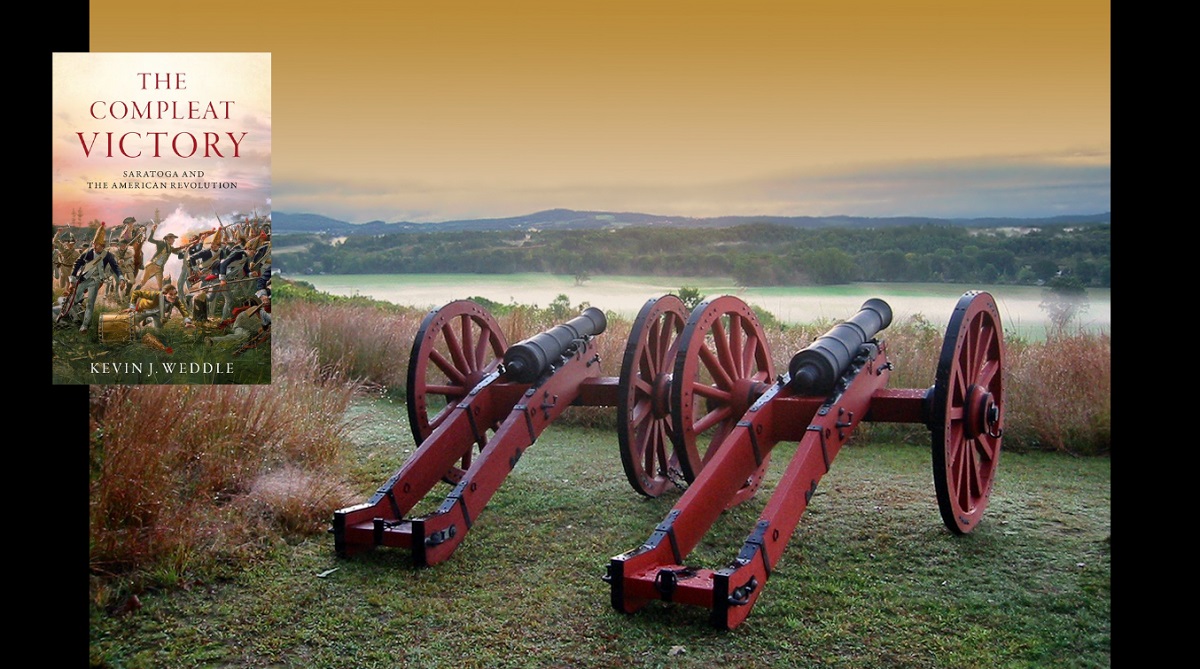
A crucial turning point in the American Revolutionary War, the Battle of Saratoga boosted the morale of the Continental Army; influenced the opinions of the French, Spanish and Dutch; and closed the door to possible invasions from the Canadian front. Kevin Weddle is in the studio to discuss the strategic lessons of this important battle as he has outlined them in his book The Compleat Victory. He joins podcast editor Ron Granieri to examine the interplay of strategic leadership, politics, personal ambition, and battlefield strategies. Their conversation visits familiar names like Washington and Howe, Gates and Burgoyne, Arnold and Morgan. It’s a great discussion for those already familiar with Saratoga’s importance but equally interesting to those who would like to learn more.
[Gates] was also a particularly good fit because the situation he found himself in fit his set of skills, almost perfectly, like a glove almost.
Podcast: Download
Kevin Weddle is Professor of Military Theory and Strategy and the Elihu Root Chair of Military Studies at the US Army War College. He is a retired Army colonel and a veteran of Operation DESERT SHIELD and DESERT STORM and Operation ENDURING FREEDOM. His second book, The Compleat Victory, has won the Gilder Lehrman Prize for Military History, the Fraunces Tavern Museum Book Award, and the Society of the Cincinnati Prize.
Ron Granieri is Professor of History at the U.S. Army War College and the Editor of A BETTER PEACE.
The views expressed in this presentation are those of the speakers and do not necessarily reflect those of the U.S. Army War College, U.S. Army, or Department of Defense.
Photo Description: Cannons overlooking the Hudson River
Photo Credit: Photo by form PxHere





From the introduction to our podcast above:
“A crucial turning point in the American Revolutionary War, the Battle of Saratoga boosted the morale of the Continental Army; influenced the opinions of the French, Spanish and Dutch; and closed the door to possible invasions from the Canadian front.”
In the New/Reverse Cold War of today, with (a) the U.S./the West, post-the Old Cold War, adopting an “achieve revolutionary change both at home and abroad” (in the name of market-democracy) political objective and with (b) such diverse entities as Russia, China, Iran, N. Korea, the Islamists — and even conservatives/traditionalists here in the U.S./the West — thus threatened by the U.S./the West’s such post-Cold War political objective — adopting “containment” and “roll back” strategies (the Russian war in Ukraine being best understood from this such point of view),
Then, from that such New/Reverse Cold War perspective, might we say that (a) the “victory” that the U.S./the West — via the Ukrainians — experienced in the Battle for Kyiv recently; this — from a strategic point of view — might be said to be similar to victory that the Americans experienced in the Battle of Saratoga yesterday?
(To wit: as a — similar — “crucial turning point;” in the contemporary case, for example, with NATO, the West, etc., becoming more expanded and more unified, etc.?)
From my New/Reverse Cold War perspective above, as yet another example of how the Battle of Kyiv — much like the Battle of Saratoga before it — might be considered as a “crucial turning point” — and as a “major strategic victory” — consider how the result of this such battle (the Battle of Kyiv in this case) seems to have possibly (and possibly only temporarily):
a. Sidelined, undermined and/or generally pulled the rug out from under “conservative”/”traditionalist” movements here in the U.S./the West, there in Ukraine and, indeed, throughout the world as a whole (possibly to include even in Russia and China?) And seems to have possibly:
b. Inspired individuals and groups throughout the world (possibly to include even in Russia and China?) — seeking to achieve “revolutionary change” more along modern/contemporary Western political, economic, social and value lines (think, for example, of such things as “diversity, equity and inclusion?”) — to become more confident and, accordingly, to feel that (a) they are not alone, (b) that their efforts are still worthwhile and (c) that they still might achieve their goals?
(One wonders if the Battle of Saratoga, likewise, [a] set the conservatives/the traditionalists/the loyalists on their back foot and [b] inspired “revolutionaries” — those seeking “modern” political, economic, social and/or value change throughout the world — to feel more confident, to not feel alone, and to have confidence in their ability to bring about “revolutionary change?” [Thus, a “crucial turning point” — and a “strategic victory” — in both such cases — indeed?])
ASIDE FROM JESUS & CHRISTIANITY THIS IS MY FAVORITE SUBJECT. THE AMERICAN REVOLUTION. THANK YOU, THANK YOU, THANK YOU. I HAVE OBTAINED A COPY OF WASHINGTONS LETTERS. ALL OF THEM. I NEED TO STICK MY NOSE AGAIN IN THAT BOOK. THANK YOU AGAIN.